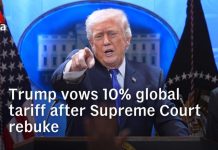
The BBC’s recent apology to Donald Trump over a misleadingly edited broadcast of his January 6 speech has sparked a fierce debate on media ethics, yet the broadcaster firmly rejects his $1 billion compensation demand.
Story Highlights
- The BBC apologized but refused Trump’s $1 billion compensation demand.
- Trump’s speech from January 6 was misleadingly edited by the BBC’s Panorama.
- The incident raises questions about media accountability and editorial ethics.
- Trump’s legal team threatens litigation against the BBC.
BBC’s Editorial Controversy and Apology
The BBC recently apologized to former President Donald Trump for a Panorama episode that misleadingly edited segments of his speech from January 6, creating a false narrative around the Capitol riots.
This controversial editing decision has drawn sharp criticism and raised questions about the ethics of media editing practices. While the BBC admitted the error and pulled the episode, they categorically refused Trump’s demand for $1 billion in compensation, citing a lack of legal grounds for such a payout.
This incident follows a similar controversy in 2022 when a BBC Newsnight broadcast faced backlash for a comparable editing approach. Trump’s legal team has been vocal about seeking damages, arguing that the misleading portrayal damaged his reputation.
However, the BBC’s legal team has rebuffed these claims, arguing that the apology sufficiently addresses the issue without necessitating financial compensation. The broadcaster stands by its decision to protect its editorial independence and avoid setting a costly precedent.
Trump’s Response and Legal Threats
Trump’s legal team has made it clear that the apology alone is insufficient, threatening further legal action unless the compensation demands are met. Trump’s re-election in 2024 adds a layer of complexity to the situation, as the stakes are high for both his public image and the BBC’s reputation.
This legal standoff has the potential to escalate, with both sides preparing for possible courtroom battles. The situation underscores ongoing tensions between Trump and major media outlets, which he frequently accuses of bias and misrepresentation.
The broader media industry is watching closely, as the outcome of this dispute could influence future interactions between public figures and news organizations.
If Trump’s compensation claim were to succeed, it might prompt a chilling effect on investigative journalism, with media outlets becoming increasingly cautious in their editorial decisions.
On the other hand, some argue that holding media accountable in this manner is essential for maintaining trust and transparency.
Implications for Media Ethics and Accountability
This incident highlights the critical balance between editorial freedom and accountability. Media analysts have noted that while the BBC’s apology was necessary, the refusal to pay excessive compensation protects the journalistic integrity that allows for robust reporting.
Legal experts suggest that Trump’s case for defamation is weak due to his public figure status and the lack of demonstrable harm caused by the edited broadcast. The incident serves as a reminder of the ongoing debate over media accountability and the responsibilities of news organizations in accurately portraying political events.
As the situation develops, it remains to be seen how it will impact the BBC and broader media practices. For now, the apology stands without financial compensation, and the legal battle lines are drawn, adding another chapter to the complex relationship between Trump and the press.
Sources:
BBC apologizes to Trump over misleading edit, but rejects basis for defamation claim
BBC apologises to Trump over speech edit but rejects compensation claim
BBC apologizes to Trump over edited clip: live updates
BBC apologizes to Trump over misleading edit, but rejects basis for defamation claim







